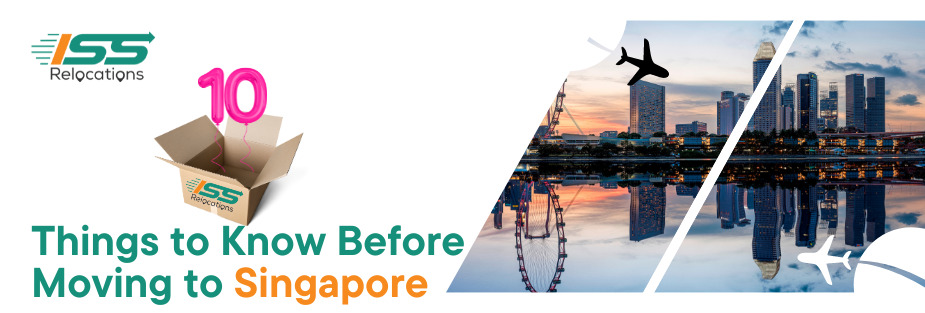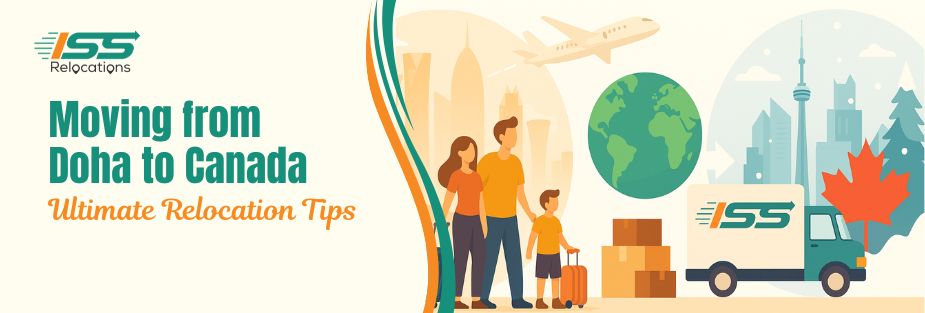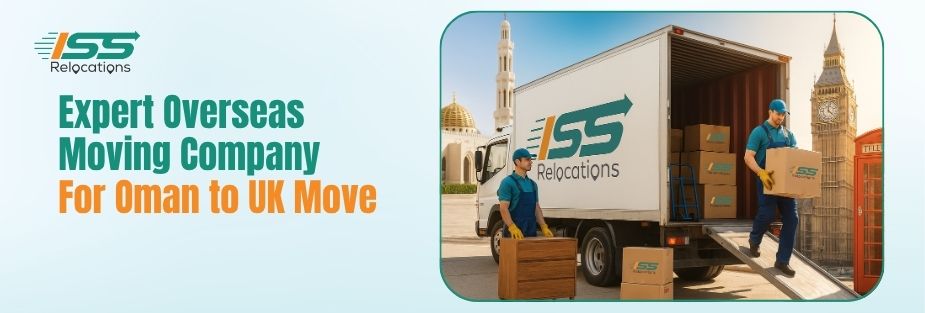
10 Things to Know Before Moving to Singapore
Singapore, often referred to as the “Lion City,” is a vibrant and bustling hub in Southeast Asia. Known for its remarkable blend of modernity and tradition, Singapore offers a unique living experience with its world-class infrastructure, diverse cultural landscape, and high quality of life. As an expat-friendly destination, it attracts people from all over the globe seeking new opportunities and adventures.
However, moving to Singapore requires thorough preparation and an understanding of what to expect. From navigating its efficient public transportation system to adjusting to its tropical climate, being well-informed can make your transition smoother and more enjoyable. This guide will walk you through the top 10 things to know before making the move, ensuring you’re fully equipped for your new life in this dynamic city-state.
To ease your relocation journey, ISS Relocations provides comprehensive services tailored to your needs. Whether it’s finding the perfect home, securing the necessary permits, or understanding local customs, our team is here to support you every step of the way.
1. Understanding Singapore’s Culture
Singapore’s culture is a rich tapestry woven from various ethnic influences, primarily Chinese, Malay, Indian, and Eurasian. This cultural diversity is reflected in the city-state’s festivals, cuisine, languages, and daily life, making it a fascinating place to live and explore.
Cultural Diversity and Harmony
One of the most striking aspects of Singapore is its commitment to multiculturalism. The government promotes racial harmony and social cohesion, ensuring that different communities live and work together peacefully. As a newcomer, embracing and respecting this cultural diversity is essential. Learning a few basic phrases in Malay, Mandarin, and Tamil can go a long way in building rapport with locals.
Etiquette and Social Norms
Understanding local etiquette is crucial for fitting in smoothly. Singaporeans value respect, politeness, and humility. Simple gestures, such as using both hands to give or receive something, can show your appreciation for their customs. Additionally, public displays of affection are generally frowned upon, and maintaining a respectful demeanor in public places is important.
Local Customs and Traditions
Singapore celebrates a variety of cultural and religious festivals throughout the year. Chinese New Year, Hari Raya Puasa, Deepavali, and Christmas are some of the major celebrations that highlight the city’s vibrant cultural scene. Participating in these festivities is a great way to immerse yourself in the local culture and make new friends.
Needs Moving to Singapore?
Begin Your Stress-Free Relocation Journey Today – Request A Quote Now!
2. Cost of Living in Singapore
Singapore is known for its high standard of living, but it also comes with a relatively high cost of living. Understanding the financial aspects of life in Singapore is crucial for effective planning and budgeting.
General Cost of Living Overview
The cost of living in Singapore can be higher than in many other countries, particularly in terms of housing and education. However, the city also offers a range of options to suit different budgets. Knowing where to spend and where to save can help you manage your finances effectively.
Housing Costs and Types of Accommodations
Housing is one of the most significant expenses in Singapore. Options range from high-end condominiums in prime locations to more affordable Housing Development Board (HDB) flats. Rental prices vary widely depending on the type of accommodation and its location. For example, a two-bedroom apartment in the city center can cost significantly more than one in the suburbs.
Daily Expenses
- Food: Singapore offers a wide variety of dining options, from affordable hawker centers to high-end restaurants. Eating at local food courts can be very economical, with meals costing as little as SGD 5-10.
- Transportation: Public transportation in Singapore is efficient and relatively inexpensive. Monthly public transport passes can help reduce costs if you use buses and trains frequently. Owning a car is much more expensive due to high registration fees and taxes.
- Utilities: Utility costs, including electricity, water, and internet, are generally moderate but can add up, especially with heavy usage of air conditioning in the tropical climate.
Is Singapore Cheap to Live In?
While Singapore may not be considered cheap compared to other Southeast Asian countries, it offers a high quality of life that justifies the costs. With careful planning and budgeting, you can enjoy all that the city has to offer without overspending.
3. Housing and Accommodation
Finding the right place to live in Singapore is a top priority for newcomers. The city offers a wide range of housing options to suit various preferences and budgets, making it essential to understand the different types of accommodations and the associated legal requirements.
Popular Residential Areas for Expats
Singapore has several popular residential areas favored by expatriates:
- Orchard Road: Known for its shopping malls, dining, and entertainment options.
- Holland Village: A trendy neighborhood with a vibrant expat community and numerous cafes and restaurants.
- East Coast: Offers a more relaxed, suburban feel with proximity to the beach.
- Sentosa: Ideal for those seeking luxury living with access to resorts and recreational facilities.
Renting vs. Buying Property
For most expats, renting is the preferred option due to the high cost of purchasing property. Here’s what you need to know about each option:
- Renting: Rental contracts typically last for one to two years. It’s important to budget for a security deposit (usually equivalent to one or two months’ rent) and to be aware of the terms for renewal or termination of the lease.
- Buying: Foreigners can buy private properties such as condominiums but face restrictions on purchasing public housing (HDB flats). The process involves significant financial commitment and legal procedures.
Legal Requirements and Processes for Renting
Renting a property in Singapore involves several key steps and legal considerations:
- Tenancy Agreement: Ensure that a comprehensive tenancy agreement is in place, detailing rent, duration, maintenance responsibilities, and other terms.
- Stamp Duty: A tax payable on the tenancy agreement, usually borne by the tenant.
- Agent Fees: If you engage a property agent, be aware of the agent fees, typically equivalent to half a month’s rent for a one-year lease.
ISS Relocations Services for Finding Accommodation
Navigating the housing market in a new country can be daunting. ISS Relocations offers services to help you find the perfect home:
- Property Search Assistance: Our team helps you identify suitable properties based on your preferences and budget.
- Lease Negotiation: We assist in negotiating favorable lease terms to ensure your rights and interests are protected.
- Relocation Services: From arranging viewings to handling paperwork, we manage the entire process to make your transition as smooth as possible.
4. Employment and Work Permits
Singapore’s robust economy and business-friendly environment make it an attractive destination for professionals seeking career opportunities. Understanding the job market, types of work permits, and employment regulations is essential for a smooth transition.
Overview of the Job Market in Singapore
Singapore boasts a diverse economy with key industries such as finance, technology, healthcare, and manufacturing. The job market is competitive, with many multinational companies having a strong presence in the city-state. Networking and leveraging online job portals can be effective strategies for finding employment.
Types of Work Permits and Eligibility Criteria
Several types of work permits are available for foreign professionals, each with specific eligibility criteria:
- Employment Pass (EP): For managerial, executive, or specialized jobs. Applicants must earn a minimum fixed monthly salary and possess acceptable qualifications.
- S Pass: For mid-level skilled workers. Requires a minimum salary and relevant qualifications or work experience.
- EntrePass: For entrepreneurs looking to start and operate a business in Singapore.
- Personalized Employment Pass (PEP): Offers greater flexibility than an EP and is not tied to a specific employer.
Application Process for Work Permits
The application process for work permits generally involves the following steps:
- Job Offer: Secure a job offer from a Singapore-based employer.
- Submission: Your employer submits the work permit application through the Ministry of Manpower (MOM) website.
- Processing: MOM reviews the application, which can take several weeks.
- Approval: Once approved, you will receive an In-Principle Approval (IPA) letter.
- Issuance: Upon arrival in Singapore, you complete the issuance process, including a medical examination and fingerprinting.
Employment Rights and Obligations
Understanding your rights and obligations as an employee in Singapore is crucial:
- Contract: Ensure you have a clear employment contract outlining salary, benefits, working hours, and other terms.
- Leave Entitlements: Familiarize yourself with leave entitlements, including annual leave, sick leave, and maternity/paternity leave.
- Workplace Rights: Employees are protected by various laws, including those addressing unfair dismissal, workplace safety, and non-discrimination.
5. Education System
Singapore’s education system is renowned for its high standards and rigorous curriculum. As an expatriate, understanding the various schooling options and admission processes is crucial for ensuring your children’s educational needs are met.
Overview of Singapore’s Education System
Singapore’s education system is structured to provide a strong foundation in both academic and non-academic areas. It consists of several stages:
- Preschool: For children aged 3 to 6, focusing on basic literacy and numeracy skills.
- Primary School: Six years of compulsory education starting at age 7, culminating in the Primary School Leaving Examination (PSLE).
- Secondary School: Four to five years, leading to the Singapore-Cambridge General Certificate of Education Ordinary Level (GCE O-Level) or the Integrated Programme (IP) which leads directly to the GCE Advanced Level (A-Level) or International Baccalaureate (IB).
- Post-Secondary Education: Includes junior colleges, polytechnics, and universities.
Types of Schools
Singapore offers a variety of schooling options to cater to different needs and preferences:
- Public Schools: Known for their high standards and competitive environment, public schools are a popular choice for many locals and expatriates. However, admission can be challenging due to limited spaces for foreign students.
- Private Schools: Offer a range of curriculums, including local and international syllabi. These schools often have more flexible admission policies.
- International Schools: Cater primarily to expatriates and offer foreign curriculums such as the International Baccalaureate (IB), British GCSE and A-Levels, and the American curriculum. These schools provide a multicultural environment and cater to the needs of international students.
Admission Processes and Requirements
The admission process varies depending on the type of school:
- Public Schools: Foreign students must go through the Ministry of Education (MOE) and may need to take an admission test. Priority is given to Singaporean citizens and permanent residents.
- Private and International Schools: Generally have their own admission procedures, which may include interviews, entrance exams, and assessment of previous academic records. Early application is advisable due to high demand and limited places.
Options for Higher Education
Singapore is home to several prestigious universities and institutions of higher learning:
- National University of Singapore (NUS)
- Nanyang Technological University (NTU)
- Singapore Management University (SMU)
Numerous polytechnics and specialized institutions offer diplomas and vocational training.
6. Healthcare and Health Insurance
Singapore boasts a world-class healthcare system, consistently ranked among the best globally. Understanding the healthcare options and insurance requirements is essential for ensuring your well-being and peace of mind while living in Singapore.
Overview of Singapore’s Healthcare System
Singapore’s healthcare system is a combination of public and private services, offering high-quality medical care and advanced facilities. The system is designed to be efficient, accessible, and affordable, with a strong emphasis on preventive care.
- Public Healthcare: Managed by the government, public hospitals and clinics offer comprehensive medical services at subsidized rates for residents and citizens. These facilities are known for their high standards of care and are accessible to expatriates, although subsidies are not available for non-residents.
- Private Healthcare: Private hospitals and clinics provide more personalized services, shorter waiting times, and a wider range of specialized treatments. However, these come at a higher cost compared to public healthcare services.
Types of Health Insurance Available
Health insurance is crucial for managing healthcare costs, especially in a foreign country. Various health insurance options are available to suit different needs:
- Employer-Provided Insurance: Many employers in Singapore offer health insurance as part of their employee benefits package. It’s important to review the coverage details to understand what is included.
- Private Health Insurance: For comprehensive coverage, many expatriates opt for private health insurance plans. These plans can cover a wide range of services, including hospitalization, outpatient treatments, dental care, and more.
- Integrated Shield Plans: These are enhanced health insurance plans that supplement the coverage provided by the national health insurance scheme, MediShield Life. They offer additional benefits and higher claim limits.
Mandatory Health Insurance Requirements
While health insurance is not legally required for expatriates, it is highly recommended. Singaporeans and Permanent Residents are covered under MediShield Life, a basic health insurance plan, but expatriates must secure their own insurance coverage.
7. Citizenship and Residency
Moving to Singapore often involves considering long-term plans, including options for residency and citizenship. Understanding the paths to permanent residency and citizenship can help you make informed decisions about your future in the city-state.
Paths to Obtaining Permanent Residency and Citizenship
Singapore offers several pathways for expatriates to obtain permanent residency (PR) and, eventually, citizenship:
- Permanent Residency (PR): PR status allows expatriates to live, work, and study in Singapore without time restrictions. Common pathways to PR include:
- Employment Pass (EP) Holders: EP holders who have worked in Singapore for at least six months can apply for PR.
- S Pass Holders: Similar to EP holders, S Pass holders can apply for PR after working in Singapore for a specified period.
- Global Investor Programme (GIP): For individuals who invest a significant amount in Singapore’s economy.
- Foreign Artistic Talent Scheme: For individuals with outstanding achievements in the arts.
- Citizenship: After holding PR status for a certain period, individuals may be eligible to apply for Singaporean citizenship. This process is highly selective and requires a strong commitment to Singapore.
Who Can Get Singapore Citizenship?
Singapore citizenship is typically granted to those who demonstrate a strong commitment to the country, including long-term residents, investors, and individuals with significant contributions to society. Eligibility criteria include:
- Permanent Residency: Applicants must be PRs for at least two years.
- Family Ties: Spouses of Singapore citizens or PRs, and children born to Singaporean parents.
- Contribution: Individuals who have made significant contributions to Singapore’s economy, culture, or society.
Long-Term Visa Options
For those not ready to commit to PR or citizenship, various long-term visa options are available:
- Long-Term Visit Pass (LTVP): For family members of EP or S Pass holders, or parents of Singaporean citizens.
- Dependant’s Pass: For spouses and children of EP or S Pass holders, allowing them to live and study in Singapore.
Legal Requirements and Application Process
Applying for PR or citizenship involves several steps:
- Documentation: Prepare necessary documents, including identification, employment records, and financial statements.
- Application Submission: Submit your application through the Immigration and Checkpoints Authority (ICA) website.
- Interview: Some applicants may be required to attend an interview.
- Processing Time: The processing time for PR or citizenship applications can vary, typically taking several months.
8. Transportation
Singapore’s transportation system is efficient, comprehensive, and well-integrated, making it easy to navigate the city-state. Understanding the various modes of transport and their costs will help you get around seamlessly.
Overview of Singapore’s Public Transportation System
Singapore boasts a highly developed public transportation system that includes buses, trains, and taxis. The system is known for its punctuality, cleanliness, and safety, providing a convenient way to travel around the island.
- Mass Rapid Transit (MRT): The MRT is the backbone of Singapore’s public transport network, covering most parts of the city. It is fast, reliable, and affordable, with trains running from early morning until midnight.
- Bus Services: Complementing the MRT, Singapore’s extensive bus network reaches areas not served by trains. Buses are frequent and well-maintained, offering a comfortable ride.
- Light Rail Transit (LRT): The LRT serves as a feeder service to the MRT, mainly in residential areas.
Costs and Convenience of Different Transport Options
- Public Transport Costs: Using the MRT and buses is cost-effective, with fares based on distance traveled. You can use the EZ-Link card or contactless payment options for seamless travel.
- Monthly Public Transport Passes: For frequent travelers, purchasing a monthly pass can be economical. These passes offer unlimited travel on MRT and bus services within a specified period.
- Taxis and Ride-Hailing Services: Taxis are readily available and can be hailed on the street or booked through apps. Ride-hailing services like Grab and Gojek are also popular, offering competitive rates and convenience.
Car Ownership and Driving Licenses
Owning a car in Singapore is considered a luxury due to high costs and strict regulations aimed at controlling traffic congestion and pollution:
- Certificate of Entitlement (COE): To own a car, you must first obtain a COE, which can be very expensive and is valid for 10 years.
- Additional Costs: Besides the COE, you need to pay for road tax, insurance, parking fees, and Electronic Road Pricing (ERP) charges.
- Driving License Conversion: If you hold a valid foreign driving license, you can convert it to a Singaporean license by passing the Basic Theory Test (BTT).
Tips for Getting Around the City Efficiently
- Public Transport Apps: Use apps like MyTransport.SG and Citymapper to plan your routes and check real-time schedules.
- Peak Hours: Avoid traveling during peak hours (7:30-9:30 AM and 5:00-7:00 PM) to experience less crowded trains and buses.
- Cycling and Walking: Singapore is becoming increasingly bike-friendly, with dedicated cycling paths and bike-sharing schemes. Walking is also a pleasant way to explore the city, especially in pedestrian-friendly areas.
9. Preparing for the Move
A successful moving to Singapore involves careful preparation and planning. From organizing essential documents to packing effectively, knowing what to prepare will ensure a smooth transition.
Essential Documents to Prepare Before Moving
Having all necessary documents ready will help you avoid delays and complications:
- Passport and Visas: Ensure your passport is valid for at least six months beyond your intended stay. Obtain the appropriate visa or work permit.
- Employment Documents: Bring employment contracts, offer letters, and any relevant professional qualifications.
- Educational Records: If you have school-age children, carry their transcripts, report cards, and any standardized test scores.
- Medical Records: Bring copies of your medical history, immunization records, and prescriptions.
- Financial Documents: Have bank statements, credit references, and tax records handy.
- Rental Agreements: If you’ve secured housing, keep a copy of your lease agreement and property documents.
Packing Tips and Guidelines
Efficient packing can make your move less stressful:
- Declutter: Sort through your belongings and decide what to keep, sell, donate, or discard.
- Label Boxes: Clearly label all boxes with their contents and the room they belong to.
- Essentials Box: Pack a box with essential items such as toiletries, a change of clothes, important documents, and basic kitchenware for immediate use upon arrival.
- Fragile Items: Use bubble wrap and packing paper to protect fragile items. Clearly mark these boxes as “fragile.”
- Clothing: Consider Singapore’s tropical climate and pack lightweight, breathable clothing.
What to Prepare When Moving to Singapore?
- Bank Account: Set up a Singaporean bank account for easy financial transactions. Some banks allow you to start the process before you arrive.
- Mobile Phone Plan: Research mobile phone providers and plans that best suit your needs.
- Utilities Setup: If you’ve rented a place, arrange for utilities such as electricity, water, and internet to be set up before you move in.
- Healthcare: Familiarize yourself with the local healthcare system and ensure you have adequate health insurance coverage.
10. Challenges and Considerations
Moving to a new country presents unique challenges. Being aware of potential difficulties and having strategies to overcome them can make your transition smoother.
Common Challenges Faced by New Residents
- Cultural Adjustment: Adapting to Singapore’s multicultural environment and diverse customs can be overwhelming. Engaging with the local community and learning about different cultures can help ease this transition.
- Climate: Singapore’s tropical climate is hot and humid year-round, which can be a significant adjustment for those from temperate regions. Staying hydrated and dressing in lightweight, breathable clothing is essential.
- Cost of Living: As previously mentioned, the high cost of living, particularly housing, can be challenging. Budgeting carefully and exploring different accommodation options can help manage expenses.
What Are the Disadvantages of Living in Singapore?
- High Cost of Living: While Singapore offers a high standard of living, it comes with substantial costs, especially for housing and schooling.
- Limited Space: Singapore is a small island with limited space, leading to densely populated urban areas. This can result in a lack of privacy and personal space.
- Strict Regulations: Singapore is known for its strict laws and regulations, which may take some getting used to. However, these contribute to the city’s safety and orderliness.
Tips for Adapting to Life in Singapore
- Stay Open-Minded: Embrace cultural diversity and be open to new experiences. Attend local events and try different cuisines.
- Learn Basic Phrases: Knowing a few phrases in Malay, Mandarin, or Tamil can be helpful in daily interactions.
- Join Expat Communities: Connecting with other expatriates can provide support and make the transition easier. There are many expat groups and social clubs in Singapore.
What Matters Most to Singaporeans?
- Respect for Rules: Singaporeans value law and order. Respecting local laws and regulations is important.
- Cleanliness: Maintaining cleanliness in public spaces is a priority. Littering and vandalism are strictly penalized.
- Community Harmony: Social harmony and respect for cultural diversity are deeply ingrained values. Being considerate and respectful in interactions is crucial.
Plan Stress-free Move with Top Moving Company in UAE - ISS Relocations

Frequently Asked Questions
Is moving to Singapore a good idea?
Yes, moving to Singapore is a great decision for its excellent quality of life, robust economy, world-class healthcare, and vibrant multicultural environment. ISS Relocations ensures a hassle-free transition with tailored relocation services, covering all the essential things to know before moving to Singapore.
How to prepare to move to Singapore?
Preparation involves securing a visa, arranging housing, understanding local laws, and organizing the shipping of your belongings. ISS Relocations provides comprehensive support, offering expert advice and practical solutions to cover all things to know before moving to Singapore.
What are the key considerations for planning a move to Singapore?
Key considerations include visa requirements, cost of living, housing options, healthcare access, and pet relocation if applicable. ISS Relocations simplifies the planning process with expert guidance and services, ensuring you’re well-prepared for your move to Singapore.
Is Singapore good for relocation?
Yes, Singapore is ideal for relocation, offering a safe environment, top-notch infrastructure, and a business-friendly climate. ISS Relocations ensures a smooth transition with services tailored to address all critical things to know before moving to Singapore.
How much money do you need to move to Singapore?
Relocating to Singapore requires approximately $10,000–$20,000, depending on visa fees, housing, and shipping costs. ISS Relocations offers cost-effective solutions to manage your budget while addressing all logistical aspects of your move.
Is Singapore too hot for dogs?
Singapore’s tropical climate can be hot and humid for dogs, but with proper care such as hydration, shaded spaces, and regular grooming, they can adapt well. ISS Relocations provides expert pet relocation services, ensuring your furry friends are safe and comfortable.
How much is a pet passport in Singapore?
A pet passport in Singapore typically costs $50–$150, including microchipping, vaccinations, and health certificates. ISS Relocations guides you through the process, ensuring all pet relocation requirements are met as part of your move to Singapore.
Moving Company - Recent Blog
Stay informed and prepared for your next move with our latest blogs on moving services in the UAE. From expert packing tips to international relocation guides, ISS Relocations brings you up-to-date insights to make your moving experience smoother, safer, and stress-free.










